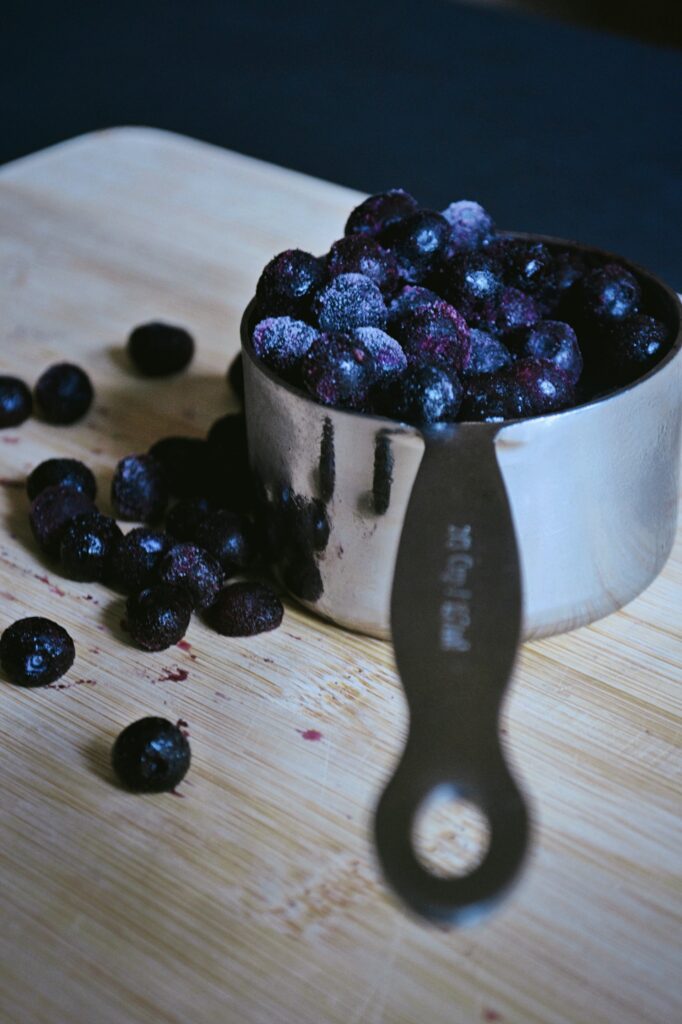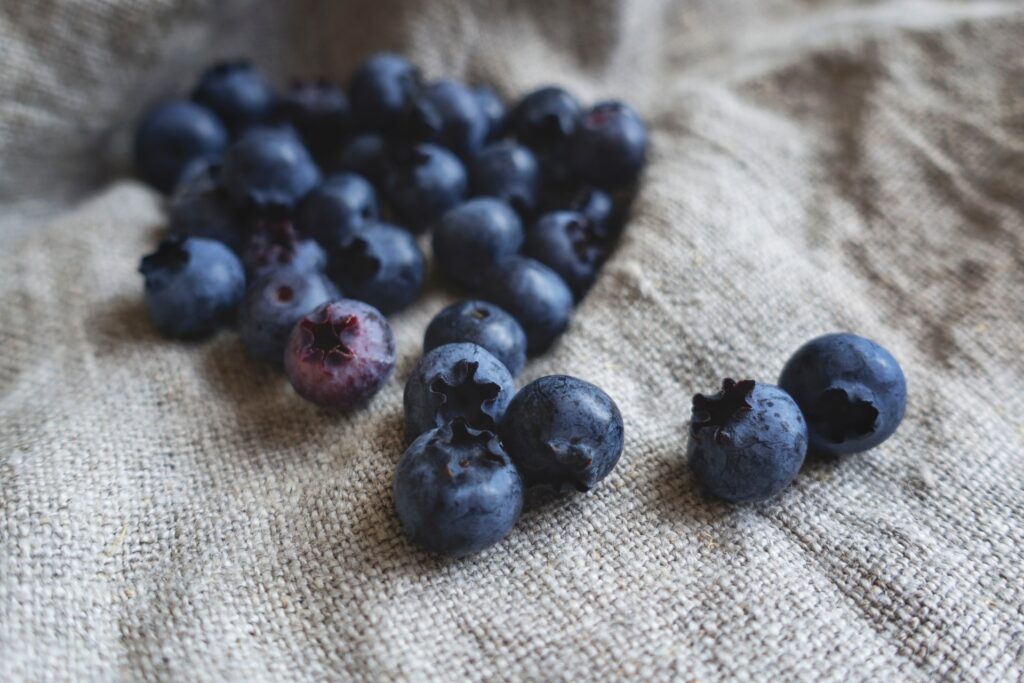4 Benefits of Eating Blueberries
Did You Know?
Blueberries are small, dark blue fruits native to and cultivated in North America. The blueberry fruit is formed when the bush develops flowers, which in turn produce single berries. The United States is the world’s largest producer of blueberries, both cultivated and wild. It is reported that Michigan is the nation’s leading producer of cultivated blueberries and Maine is the leading producer of wild blueberries. Blueberries are especially healthy because they contain fiber, vitamin C, K, manganese, and potassium with just 80 calories per serving (1 cup). Research supports the benefit of eating blueberries for heart health, brain, and gut health. Continue reading to discover 4 ways blueberries can benefit your health

4 Benefits of Blueberries
1. High in Antioxidants
Blueberries have antioxidants in the form of anthocyanins. Anthocyanins are a water-soluble color pigment that is prevalent in many fruits and vegetables. These properties are responsible for the red, purple, and blue color in fruits, vegetables, and some edible flowers. Red anthocyanins are found in red cabbage, purple in purple potatoes, and in blueberries, their dark blue color. Besides adding pigment to food, studies have proven these antioxidants also possess antimicrobial properties, support neurological health, and protect against chronic diseases like diabetes and heart disease. There are 600 different anthocyanins in the plant kingdom, and they are mainly reported to be anti-inflammatory with multiple mechanisms of action. They function directly, by destroying free radicals produced by oxidative stress and by regulating cell production.

2. May support Heart Health
Blueberries can support heart health through their antioxidant profile of anthocyanins. Studies have proved a relationship between total anthocyanins and the risk of developing cardiac-related diseases. One study found that the daily intake of 1 cup of blueberries improved the function in the lining of the heart, improved arterial stiffness, and reduced high cholesterol. Another study also found that intaking 1 cup of blueberries also reduced the negative effects of high fat/high sugar diets on cardiac health. Researchers have found that an increase in anthocyanin dietary intake through different food sources had a 12-32% reduction in risk for heart disease.
3. Help with Muscle recovery
Blueberries can help with muscle recovery because of their anti-inflammatory and anti-oxidative benefits. Strenuous exercise that results in muscle damage is usually accompanied by inflammation and oxidative stress. Despite exercise being a positive part of a healthy lifestyle, exercise is acutely inflammatory, and depending on the amount and duration, it could become chronically inflammatory. Research supports that long and intense exercise increases inflammatory mediators and in turn prolongs inflammation. Although a pro-inflammatory process is necessary for an optimal healing process, long-lasting inflammation is dangerous.
Ideally, the body can regulate inflammatory processes, however, anti-inflammatory foods support the body to do so. One study published using New Zealand blueberries in the International Society of Sports Nutrition found that consumption before and after exercise-induced muscle damage accelerated muscle recovery.
Read more about inflammation here

4. Help protect against Infections
Anthocyanins have been studied for their antimicrobial benefits as a possible solution to drug-resistant microbes or as an alternative to pharmaceutical options. As blueberries are one of the richest sources of fruit-based anthocyanins, researchers have proposed their benefit against urinary tract infections (UTIs), much like cranberries. Studies already report that anthocyanins extracted from blueberries are effective against several gram-positive (Staphylococcus aureus and clostridium perfringens) and gram-negative (Salmonella enterica and E.coli) food-based pathogens. Research overall supports that purple, red, and blue-colored anthocyanins have a mechanism against microbial infection however, more research needs to be conducted to verify these findings in how they can be practically applied.
What Should You Do About It?
First, talk to your doctor. Especially if you take certain medications or have a medical history. There is not much research to link any allergic cross-sensitivity between blueberries and other berries, however, you should still be cautious if you have an allergy history to raspberries, blackberries, or strawberries.
I do not recommend taking blueberry extract as a supplement before talking to your doctor. There is one genetic disorder named G6PD that affects the ability to break down certain chemicals in food, one of which is found in blueberries. Additionally, blueberries could potentially lower blood sugar so monitor blood sugar closely. Lastly, drinking milk along with blueberries can impair their antioxidant benefits. One study compared plasma concentrations of two antioxidants (caffeic and ferulic acid) in healthy participants who consumed blueberries with milk vs with water. Blood samples were collected at baseline, 1,2, and 5 hours post-consumption to measure the plasma concentration of two antioxidants (caffeic and ferulic acid). The results supported that participants who drank milk with blueberries had a reduced absorption of caffeic acid.

How To Make It SMART
SHORT- Commit to including blueberries in your diet. They are a low-calorie, nutritiously dense fruit. You can include them in yogurt, a smoothie, in oatmeal, or eat them alone
MEASURABLE- Blueberries should be consumed as part of an overall healthy lifestyle. They will not be a cure to one ailment, but they support healthy by preventing the development of chronic diseases
ATTAINABLE – This should be something worth implementing especially as a choice to support healthy wellbeing
REASONABLE- Blueberries are a convenient food and can be added to different food options
TIMELY- Commit to including blueberries into your diet to support overall health. Keep them in your fridge and reach for them as a snack option
As always,
Love yourself in health, one day at a time



